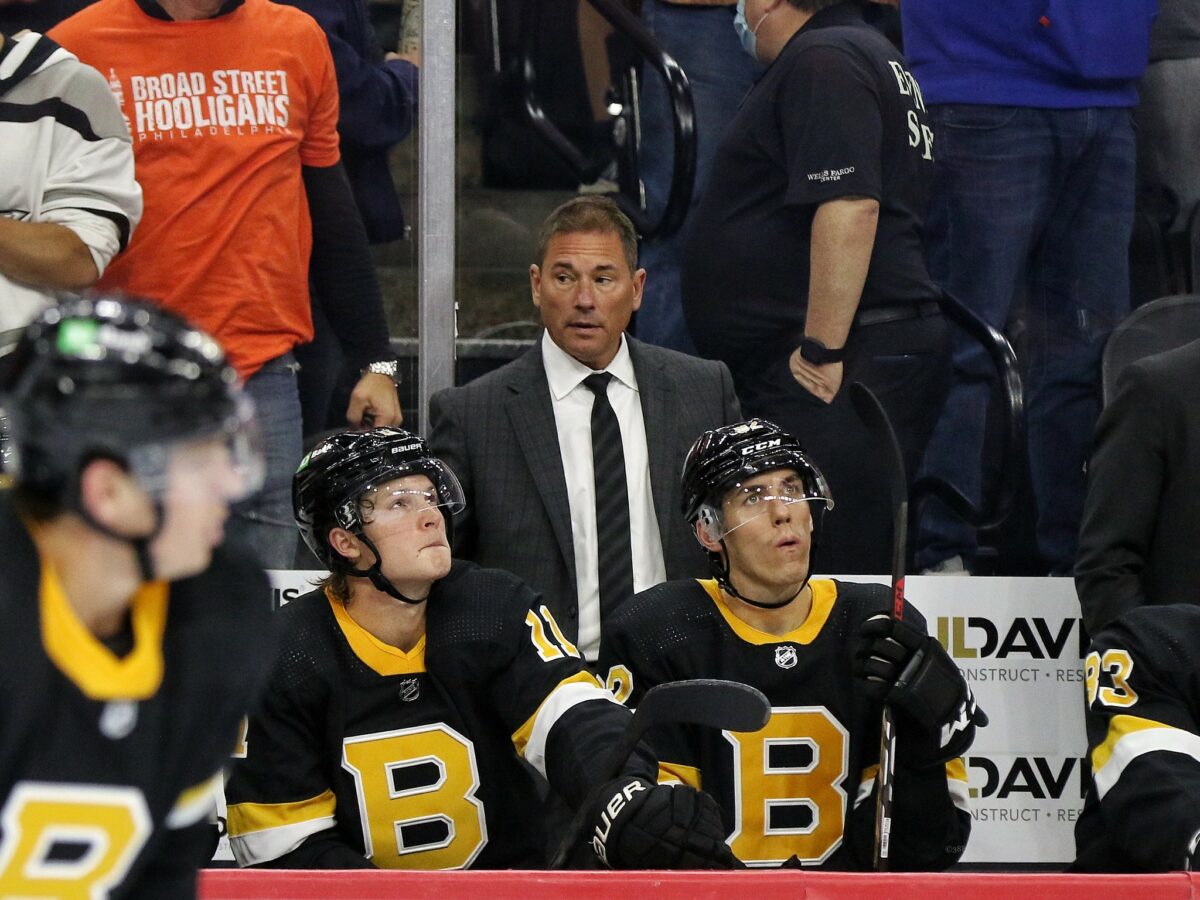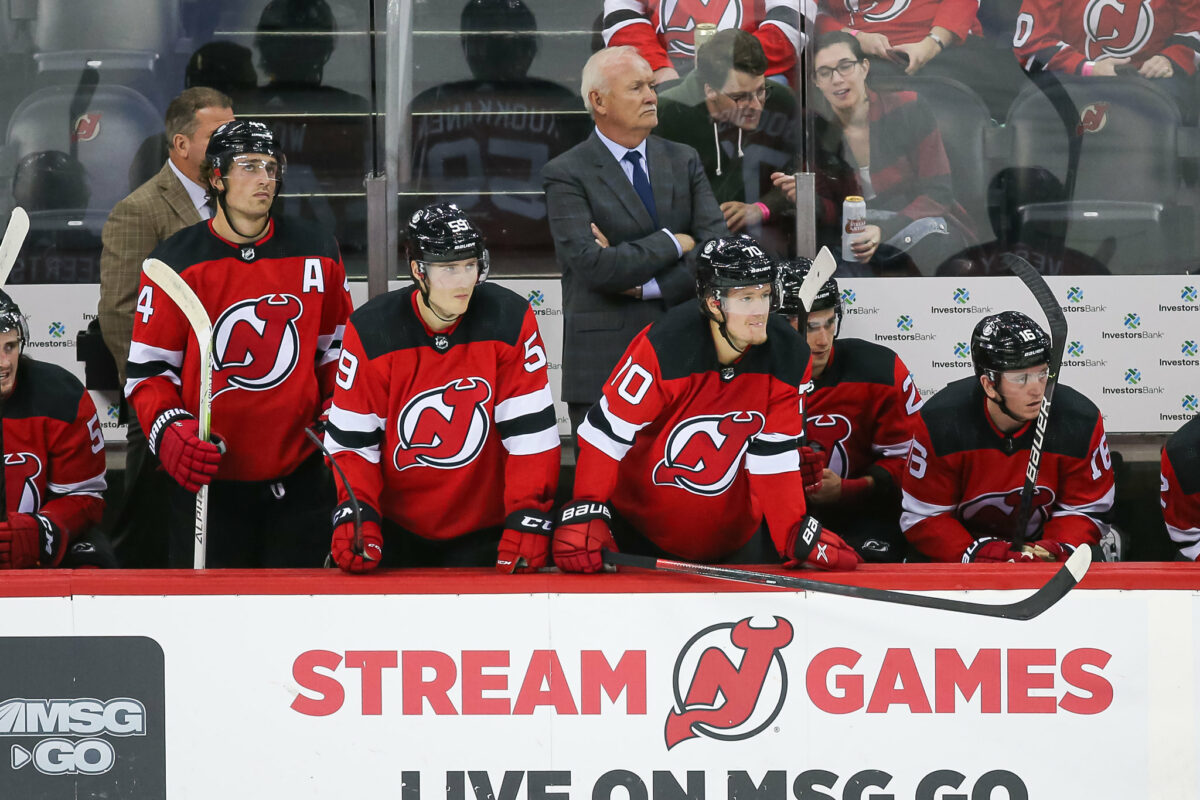On Monday, the Boston Bruins shocked the world when they fired head coach Bruce Cassidy. Though the Carolina Hurricanes knocked out the Bruins in seven games in the first round of the playoffs, Cassidy guided the Bruins to a 51-26-5 record this season. Overall, he had a 245-108-46 record in five and a half seasons in his stint with the Bruins. He’ll now become one of the hottest coaches available in a coaching market that includes Pete DeBoer and Barry Trotz, to name a couple.
Though Lindy Ruff is still the coach of the New Jersey Devils, general manager Tom Fitzgerald was pretty vague about Ruff’s status at his end-of-season press conference about a month ago. He never directly confirmed Ruff would return as coach next season and stated he hired Ruff “to be his partner.” With Cassidy now available, that could change things. Fitzgerald should look to pursue him, but that doesn’t mean Ruff can’t have a role with the Devils moving forward too.
Cassidy’s Bruins Stint Was Nothing Short of Superb
Even though the New York Islanders recently fired Trotz, Cassidy’s ousting may have topped it as the most stunning of the offseason. The Bruins had plenty of success under him and were always among the top teams in the Eastern Conference. Though the Atlantic Division was quite top-heavy in 2021-22, the Bruins still found success, as shown by their 51 wins.
Not only did the Bruins find success in the win-loss column under Cassidy, but they also had some of the best underlying numbers of any NHL team. They finished this season with an expected goals percentage (xG%) of 57 percent, first in the NHL. That was not an outlier, either, as the Bruins consistently ranked in the top 3 in xG% during Cassidy’s tenure:
The Bruins were one of the top shot-generating teams in the league at five-on-five under Cassidy, both in quality and quantity, ranking in the top 11 in shot attempts and xG per 60 minutes. But where they really thrived was on defense. Since 2017-18, Cassidy’s first full season as the Bruins’ coach, they have ranked first in shot attempts and xG against per 60 minutes.
Nor did that come out at the expense of offense, specifically for the Bruins’ top players. Patrice Bergeron just won the Selke Trophy as the league’s best defensive forward in 2021-22, but his best offensive seasons took place under Cassidy. Brad Marchand has totaled 336 points in 272 games over the last four years under Cassidy, with his lone 100-point season coming in 2018-19. David Pastrnak has been a consistent 40-goal scorer in that time as well.
Everything the Bruins did under Cassidy seems to solidify him as one of the best coaches in the NHL. But the Bruins did fire him, so what’s their reasoning behind the decision? And is it something the Devils should be concerned about if they’re to pursue him?
Cause for Concern With Cassidy’s Coaching Style?
Per Fluto Shinzawa of The Athletic, one of the main reasons the Bruins decided to move on from Cassidy was his coaching style, specifically with the team’s younger players. Per Shinzawa, Cassidy is a demanding but fair coach and is at his best coaching veterans. (What we know about the Bruins’ firing of coach Bruce Cassidy’ – The Athletic, 6/6/2022).
Even after some trades and free-agent signings this summer, the Devils will still be one of the youngest teams in the league next season. Their best players — Jesper Bratt, Nico Hischier, Jack Hughes — will be 24 years old or younger. Even players who will complement them, like Yegor Sharangovich and Dawson Mercer, will be in their early to mid-20s.
Is there reason to be concerned about how Cassidy would handle a roster that’ll likely have an average age of about 25 years old? Perhaps, but it might be a bit overblown. He coached 460 games in the AHL and was very successful, totaling a 249-155-11 record. The AHL is largely a developmental league, so he must’ve been doing something right to accumulate such a record.

Some of that played out in the NHL too. Cassidy did quite well in developing Charlie McAvoy, and despite some tension between the two, Jake DeBrusk was a 20 to 25 goal scorer under Cassidy. The Bruins’ lack of success with many of their younger players likely falls on their inability to draft well. After all, they passed on Mathew Barzal, Kyle Connor and Thomas Chabot in the first round of the 2015 draft in favor of DeBrusk, Jakub Zboril and Zach Senyshyn.
And it’s not drafting that’s been a problem for the Bruins, either. Acquiring and re-signing Taylor Hall has worked out well, but their other roster moves leave plenty to be desired. Nick Foligno had two goals in 64 games in 2021-22 but has another year left on his contract. Ditto for Tomas Nosek, who had three goals this season. On defense, they have Derek Forbort signed for another two seasons at a cap hit of $3 million. Because of depth signings like Forbort that have not worked out, the Bruins have just $2,383,333 in cap space this summer. That’s not on Cassidy; it’s on general manager Don Sweeney.
Related: Devils’ 2022 Free Agent Targets: Goaltenders
That would lead me to believe there are more macro issues in the front office rather than Cassidy being the main problem. So while there may be some concerns about Cassidy’s demanding style and how it impacts younger players, there’s plenty to suggest that he wasn’t the only issue with the Bruins.
What About Ruff?
It’s pretty clear Fitzgerald likes Ruff. He is still the Devils’ head coach, and though he never confirmed Ruff as coach for next season, Fitzgerald did speak highly of him at his end-of-season press conference. But just because they should pursue Cassidy doesn’t mean Ruff can’t be part of the Devils moving forward. Ruff has spoken about using advanced metrics in his press conferences. It’s clear he uses it in some of his lineup decisions during the season, and that’s how Fitzgerald seems to operate when it comes to making signings and trades during the offseason.
During his exit interview, Jack Hughes also spoke highly of Ruff, saying he really likes Ruff and hopes he’s around to coach next season. The last thing the Devils want to do is upset the player who will be the face of their franchise for at least the next eight years. It’s clear Ruff had a positive impact on Hughes’ development (Hischier and Bratt too), so keeping him around in some capacity sure seems like a good idea.

If Fitzgerald does pursue Cassidy, which he should, keeping Ruff should also be in the cards. It could be as director of player personnel, senior VP of hockey ops, or president of hockey ops. Heck, Fitzgerald can even create a position for Ruff. It wouldn’t be the first time that’s happened for someone well-liked in an organization, and it’d still allow Ruff to be Fitzgerald’s partner in crime.
Given Cassidy’s availability, the Devils have to pursue him at a minimum. He’s going to have plenty of suitors over the coming weeks, so he’ll likely be able to pick whichever team he wants to coach. Maybe it’ll be the Devils, maybe it won’t, but it wouldn’t be a good look if they didn’t at least interview him. Coaches like Cassidy don’t become available often. With his track record and ability to get teams to the playoffs consistently, it’d be a mistake to bypass a pursuit, especially with how the team’s last two seasons have gone. And it could be something they regret down the road if they don’t at least give him a call.
* * *
Advanced stats from Natural Stat Trick